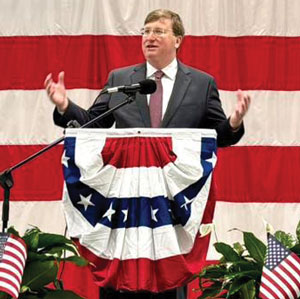Cutting taxes, improving education and funding sites rebuilt Mississippi.
Spend just 10 minutes listening to Mississippi Gov. Tate Reeves explain his core philosophy for governing, and you quickly learn that he has several bedrock principles: lower taxes for citizens and businesses; remove barriers to workforce entry; raise academic standards; measure progress; hold leaders accountable; invest in site development; and work constantly to expedite speed to market for expanding companies.
By adhering to these tenets, Reeves has remade the Mississippi school system and the Mississippi economy in just five years. Recently, we caught up with the governor to ask him how he did it.
Now that you have eliminated the personal income tax, what effect do you expect this new law to have on Mississippi?
GOV. REEVES: This is a historic moment for Mississippi. Eliminating the personal income tax is truly a gamechanger for our state. It will result in a competitive advantage when competing for new economic development projects, and it will help us attract new private capital investment and additional residents.
Eliminating Mississippi’s income tax puts us in a rare class of elite, competitive states. There are only a handful of states in the country that do not tax income. Mississippi is now one of them.
Everyone keeps talking about the Mississippi Miracle and your state’s turnaround in public education attainment. How did Mississippi achieve this?
GOV. REEVES: Mississippi is not making news — we’re making history. Our nation-leading education gains are just the latest example. In fact, our fourth- and eighth-grade NAEP scores are so good that even Vice President J.D. Vance talked about it on social media.
While some states lowered standards, Mississippi did the complete opposite. When we passed the Literacy-Based Promotion Act in 2013, we said we’re not passing kids who aren’t ready, just to appease adults and make the coalition of the status quo feel better. Instead, we said that by the fourth grade, Mississippi students shouldn’t be learning to read, they need to be reading to learn. We took a lot of heat in 2013 for passing the Act, but it was the right thing to do. And that made the Mississippi Miracle possible.
We also focused on phonics-based learning. Mississippi was ahead of the curve, and it paid off. We deployed literacy coaches to help teach the teachers on reading best practices. This was also huge for our state and made a tremendously positive impact.
Site readiness has become a major issue in economic development. How is Mississippi competing with other states in this regard?
GOV. REEVES: A few years ago, when I talked to business leaders from around the country, they asked about financial incentives. Today, I typically get two questions. They ask me about the quality of our workforce and about speed to market for their products.
Now first, our workforce is fantastic. I believe it’s what is winning Mississippi so many great economic projects. Second, the key to winning the speed to market pitch is actively developing major sites across the state.
One of my top priorities is to continue investing in project-ready sites across our state. We have to invest more to remain competitive and win new business. Project-ready sites are the lifeblood of economic development, and Mississippi will continue winning new business as long as they are available. By investing more toward site development, we will continue sending a message to the world that Mississippi is open for business.
We’ve focused on site development, investing over $178 million in more than 70 sites across the state and adjacent to important labor and infrastructure connections. In November 2024, I announced over $110 million in new investment, which will primarily go toward developing more project-ready sites across the state.
What is Mississippi’s Power Play — and how do you plan to position Mississippi as a leader in the energy economy?
GOV. REEVES: I was proud to announce a new initiative: Mississippi’s Power Play. Its goal is to make Mississippi a leader in American energy. I want to tear down red tape, stimulate investment, and make Mississippi a model state for energy policy and investment. I want to see faster permitting, reduced financial risk, and strategic investment. Everything, and I mean everything, is on the table.
Through Mississippi’s Power Play, we have the opportunity to:
- Attract billions in new private sector investment.
- Collaborate with our educational institutions to create curricula focused on energy technology and innovation.
- Support startups and engage the community.
- Research and develop advanced energy technology.
- And collaborate with industry-leading technology companies to implement advanced energy solutions in Mississippi.

Gov. Reeves tours a plant in Mississippi.
I was also proud to host a summit in Jackson with 28 energy CEOs and senior executives for a robust discussion about the future of energy in our state. This includes experts in the fields of:
- Petroleum
- Nuclear
- Natural gas
- Major and regional utility providers
- Energy cooperatives
- Private equity and venture capital
- Energy infrastructure
- State and federal government partners
The goal of the summit was to better understand the barriers that may hinder the rapid planning and construction of new-generation and transmission-capacity projects, to learn how Mississippi’s utilities can take advantage of opportunities to promote innovation in grid management, energy efficiency, and the deployment of next-generation, AI-powered solutions, and how sources of energy and their deliveries should be integrated, balanced and — of course — prioritized in and for our state.
Mississippi’s manufacturing sector saw the nation’s eighth highest increase in GDP in 2024. To what factors do you attribute that growth?
GOV. REEVES: In Mississippi, we build stuff — real stuff — and we’re incredibly proud of our manufacturers. While some states gave up on manufacturing 20 years ago, Mississippi stood behind this important industry and the great work they do to fuel our economy.
We’ve invested millions toward workforce development and in project-ready sites across our state. That’s made a massive difference. Manufacturers know Mississippians will get the job done. And they know that they can quickly relocate their operations to one of our many project-ready sites. Again, speed to market is key, and Mississippi is knocking it out of the park in that regard.
When you took office as governor, it was your intent to follow a certain economic plan to promote growth and prosperity. Are there certain governing principles that you live by?
GOV. REEVES: From Day One, I’ve made economic development and speed to market a priority. And that’s why 2024 — on so many levels — marks the most successful year in Mississippi history. We broke record after record and our economy roared. Billions of dollars were invested in our state, and thousands of jobs were created. Unemployment reached an all-time low, and Mississippi was top three in the nation for the fastest-growing economy and top four for the fastest-growing per-capita income in America.
Since I’ve been governor, Mississippi has announced almost $35 billion in new private sector investment. Just last year, we finalized the single largest private sector investment in Mississippi history: the $10 billion Amazon Web Services project. In 2024, we also announced the single largest payroll commitment in state history — a $2 billion private sector investment by Accelera by Cummins, Daimler Trucks & Buses, and PACCAR that will create 2,000 jobs with an average annual salary of $66,000. That’s more than $130 million that will be paid out to Mississippians every single year.

“There’s never been a better time to invest private capital in Mississippi. We’ve done what it takes to build a strong workforce and improve speed to market for companies.”
— Gov. Tate Reeves
We also broke new ground on the largest private sector investment in the history of the Mississippi Delta — a $1.2 billion investment by Entergy to build the Delta Blues Advanced Power Station in Greenville. Once completed, this facility will generate enough energy to power 385,000 Mississippi homes.
And just one month into 2025, we did it again. I was proud to help break ground on the new Compass Datacenters project: a $10 billion private sector investment for a new hyperscale data center in Meridian, which ties the AWS project for the largest project in the history of our state.
The huge AWS win was called a game-changer by a lot of people. How has that win impacted your state since?
GOV. REEVES: The $10 billion AWS project has had a remarkable ripple effect, and while it’s still under construction, thousands are already at work due to AWS choosing to locate in Mississippi.
That project positioned Mississippi as a hub for cloud computing and machine learning, and others have taken notice — like Compass Datacenters, which is locating a data center complex in Meridian. The project will eventually mark $10 billion in new investments. And we have more exciting news coming down the pipeline.
Yancey Engineered Solutions located in Batesville, where it will make aluminum and steel generator enclosures and fuel tanks to be used primarily by data centers. And Mississippi’s own Camgian — a software developer specializing in AI and machine learning — is expanding in Starkville.
What is your message to CEOs and other business leaders who are watching this Mississippi renaissance from afar?
GOV. REEVES: There’s never been a better time to invest private capital in Mississippi. We’ve done what it takes to build a strong workforce and improve speed to market for companies. Mississippi has what it takes to get your products to market, and our people will always get the job done, and done right. Let’s Break New Ground together. I encourage you to reach out to our team at the Mississippi Development Authority.

